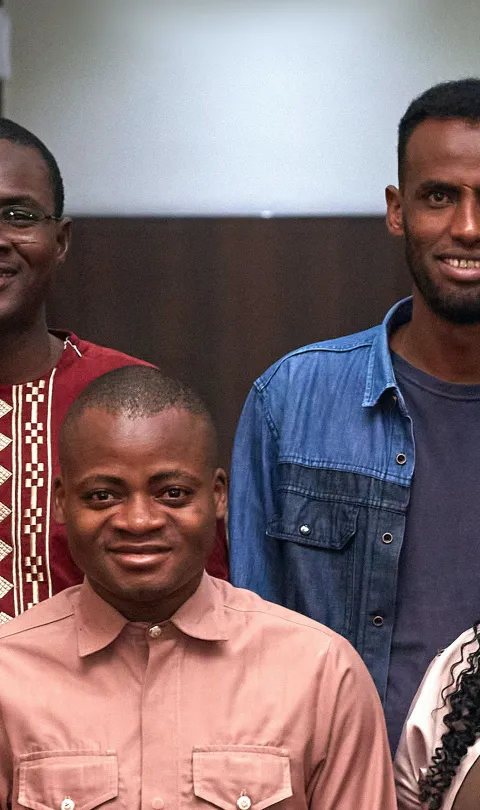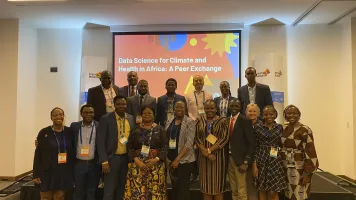Introducing the third cohort of CAN Fellows using data for climate-health resilience in Africa
Young people are increasingly on the frontlines of climate-related health challenges. From heat stress and malnutrition to rising cases of malaria and dengue, the climate crisis is deepening existing health vulnerabilities while creating new ones. In both urban and rural settings, young people, especially those in low- and middle-income countries, are disproportionately exposed to environmental hazards that compromise physical and mental well-being. The post-COVID era has only intensified this burden, disrupting health systems, increasing mental health crises, and widening inequalities in access to care. Despite their growing awareness and activism, young people often find themselves navigating these risks without the necessary tools to understand, respond to, or communicate the complex relationship between climate change and public health.
Central to this gap is the lack of access to timely, localized, and usable data. Granular information on temperature spikes, air quality, disease outbreaks, and health system responses is often siloed, outdated, or inaccessible to youth and the communities they advocate for. Without accessible, high-quality data, young people cannot make evidence-based decisions, influence resources, or shape meaningful policy change. This creates a critical disconnect between youth-led climate-health activism and the information systems that underpin effective resilience planning. Empowering young people with the skills, platforms, and support to gather and interpret climate-health data is essential not just for inclusion but for building adaptive, community-informed responses to a rapidly evolving climate and health landscape.
This data-driven approach directly supports the Belém Health Action Plan (BHAP), which will be finalised at COP30, that emphasizes climate-resilient and equitable health systems grounded in data, participation, and local leadership. BHAP calls for inclusive early warning systems and stronger community data ecosystems, both of which are addressed through youth-led citizen science and localized data initiatives. By equipping young people to generate hyperlocal, actionable evidence, this initiative aligns with BHAP's priorities of democratizing health data, fostering inclusive decision-making, and enhancing the adaptive capacity of health systems under climate stress.
Local leadership is essential for translating climate-health challenges into actionable insights. While global climate models and public health data often provide high-level direction, they rarely reflect the lived realities of communities in vulnerable regions. By enabling young data scientists to lead research and innovation in their own contexts, we ensure that solutions are grounded, responsive, and more likely to be adopted. This growing movement of youth-led, data-driven action is helping close the gap between global ambition and local resilience.
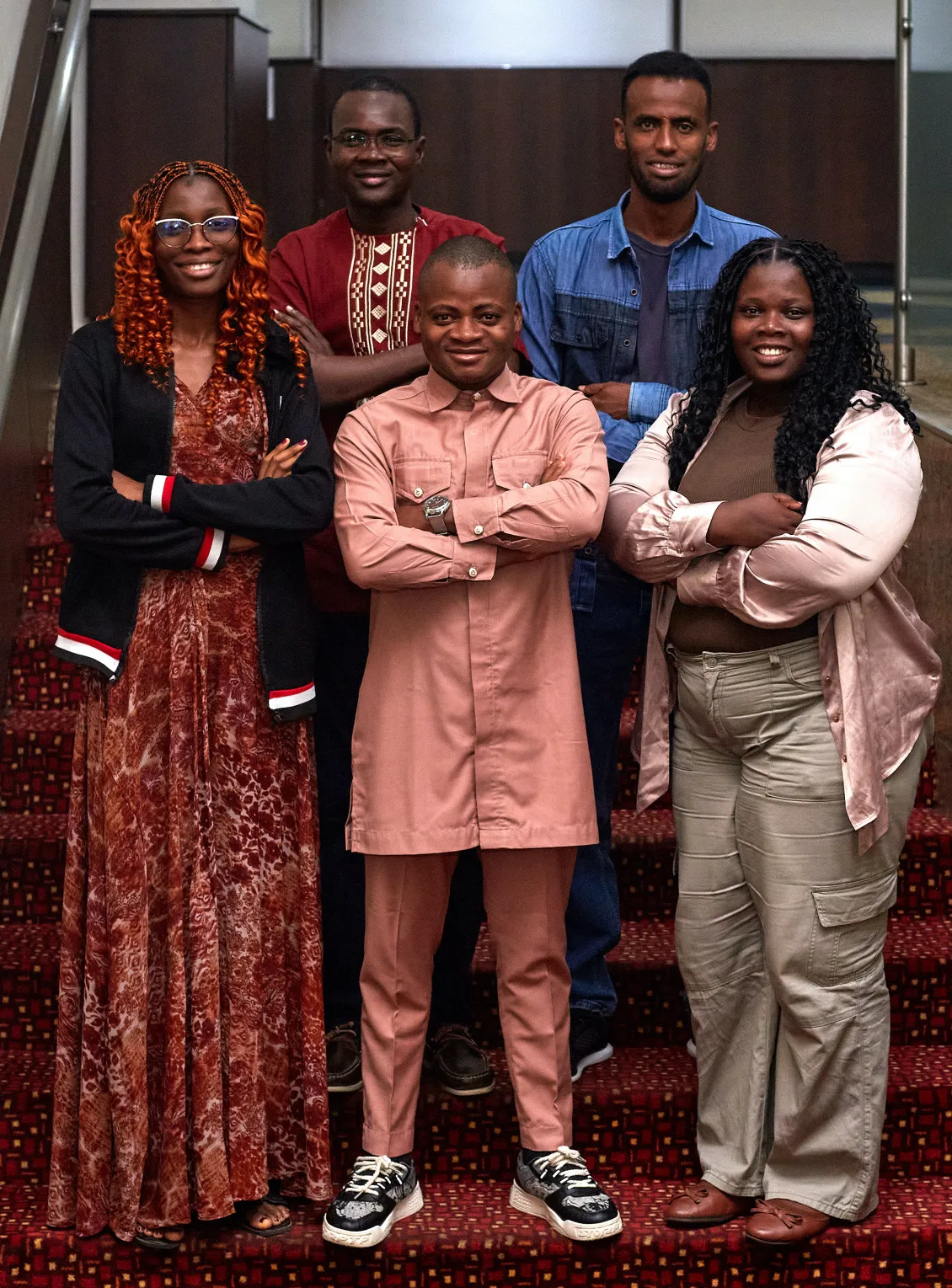
Through the Africa Climate and Health Data Capacity Accelerator Network (CAN), the Global Partnership for Sustainable Development Data, together with data.org and with support from Wellcome Trust, is working to strengthen climate and health data systems across Africa for there to be better resource allocation at the local level and stronger evidence for policies that will build out more climate-resilient health systems. As part of their work, CAN fellows support government and social impact organizations-led use cases through:
- The development of predictive models that forecast disease outbreaks, heatwave impacts, or stress on local health systems under various climate scenarios,
- The creation of user-friendly dashboards or apps that allow community members to input and visualise hyperlocal climate-health data,
- Training peers and community groups in data literacy, data science, and analysis tools,
- Co-development of workshops to bridge the technical and community-level understanding of data and
- Turning complex datasets into compelling stories that use visualisations, infographics, or reports tailored for policymakers or community workers.
Beyond their individual projects, CAN fellows are part of a growing ecosystem of data practitioners committed to strengthening Africa’s health and climate systems. Through technical mentorship, peer learning exchanges, and collaboration with government and research institutions, fellows contribute to building long-term capacity in data science and decision-making. Their work not only delivers immediate insights but also lays the foundation for a stronger, more inclusive public data infrastructure.
Two previous cohorts of CAN data science fellows have significantly advanced the climate-health data agenda across Africa. We are now proud to introduce the third cohort, who will continue this work in the coming months, building on progress and pioneering new data-driven solutions.
Meet the Fellows
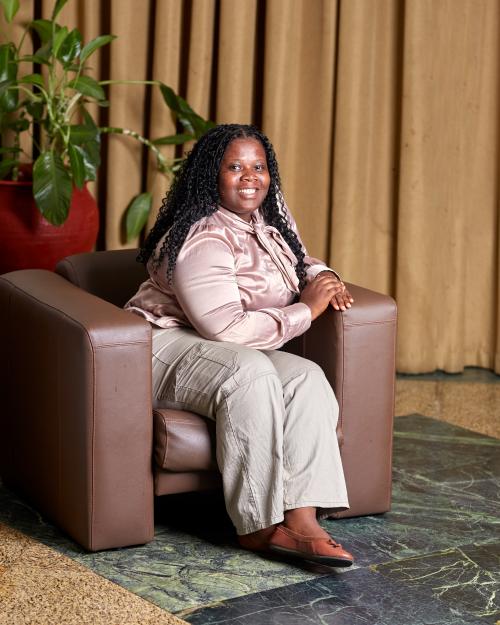
Linda Arthur (Ghana) is a data analyst and scientist who sees data as a key to solving real-world challenges. As a Melton Senior Fellow and global citizen, she brings a thoughtful, cross-cultural perspective to every project. At Ashesi University in Accra, she supports research by critically analyzing tools, designing materials for data collection, and drawing insights from complex information. Linda has explored trends across Africa as a data analyst at Zerone AnalytiQs, turning raw data into clear, compelling stories. She's taught courses in computing, facilitated dialogues on gender and governance, and led campus initiatives focused on sustainability. For Linda, working with data isn’t just technical, it’s a way to understand people, spark change, and build a better future. As a CAN Fellow, she is utilizing her data skills to map out and make a case for the urgency of addressing landfill air pollutants and extreme weather conditions and their impact on respiratory health in Ghanaian communities, especially in Accra.

Racheal Ogbozor (Nigeria) is a clean energy advocate, data analyst, and gender equity champion committed to climate justice and community resilience. As a CAN fellow, she is leading a case study evaluating the effectiveness of climate-adaptive malaria control strategies in Nigeria. Her work will culminate in a comprehensive evaluation report to inform national health and climate interventions. Racheal also serves as Gender and Clean Cooking Lead at an energy access organization, promoting solar and clean cookstove adoption among women and youth. She brings a data-driven perspective to all her work, with experience across nonprofit, environmental, and educational sectors. Her work bridges gender, technology, and sustainability to ensure inclusive climate-health solutions.

Israel Odeajo (Nigeria) is an AI Engineer and Machine Learning Specialist with over a decade of experience across Africa, Europe, and North America. Based in Nigeria, he works remotely with DivVerse Labs (US), Join Momentum (UK), and BTC Creative Labs (Germany). As a CAN fellow, he is leading a project in Benue State, Nigeria, modeling the effects of climate variability on infectious diseases such as cholera, malaria, typhoid, and Lassa fever. His deliverables include a validated predictive model and geospatial risk maps to support targeted public health interventions. Israel holds certifications from Stanford, DeepLearning.AI, and Microsoft, and is driven by a passion for building inclusive, scalable AI solutions for social good.

Berhe Aregawi Gidey (Ethiopia) is a lecturer and researcher specializing in algorithms, machine learning, and data science, with applications in healthcare, geospatial analysis, and environmental sustainability. As a CAN fellow, He is leading a CAN case study in Tigray, Ethiopia, integrating climate, health, and socioeconomic data. His deliverables include risk prediction tools, spatial risk maps, and targeted policy recommendations to support intervention planning. Berhe holds an MSc in Computer Engineering and certifications from UC San Diego, Stanford, and DeepLearning.AI, and is committed to applying AI to address complex social challenges.
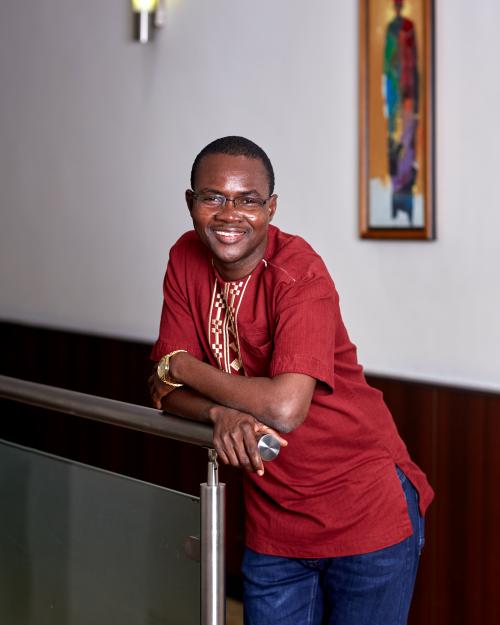
Dr. Gouvidé Jean Gbaguidi (Benin) is a climate and public health expert with a PhD in Climate Change and Disaster Risk Management, specializing in infectious disease modelling. As a CAN fellow, he is conducting a national case study in Benin to support malaria elimination efforts using a data-driven approach. His work involves a predictive modeling framework, prevalence mapping, and resource allocation recommendations to inform the National Malaria Elimination Programme. With additional degrees in hydrology and biology, Dr. Gbaguidi’s research spans WASH in epidemic contexts, zoonoses, and climate-health vulnerabilities. His publications are accessible via ORCID.
As the climate crisis continues to test the resilience of health systems across Africa, the work of these fellows offers a model for what’s possible when local expertise, inclusive data, and bold collaboration come together. We invite governments, funders, researchers, and community organizations to partner with us in expanding this work, amplifying the voices of young data leaders, and ensuring that no one is left behind in the pursuit of climate-resilient health futures.
